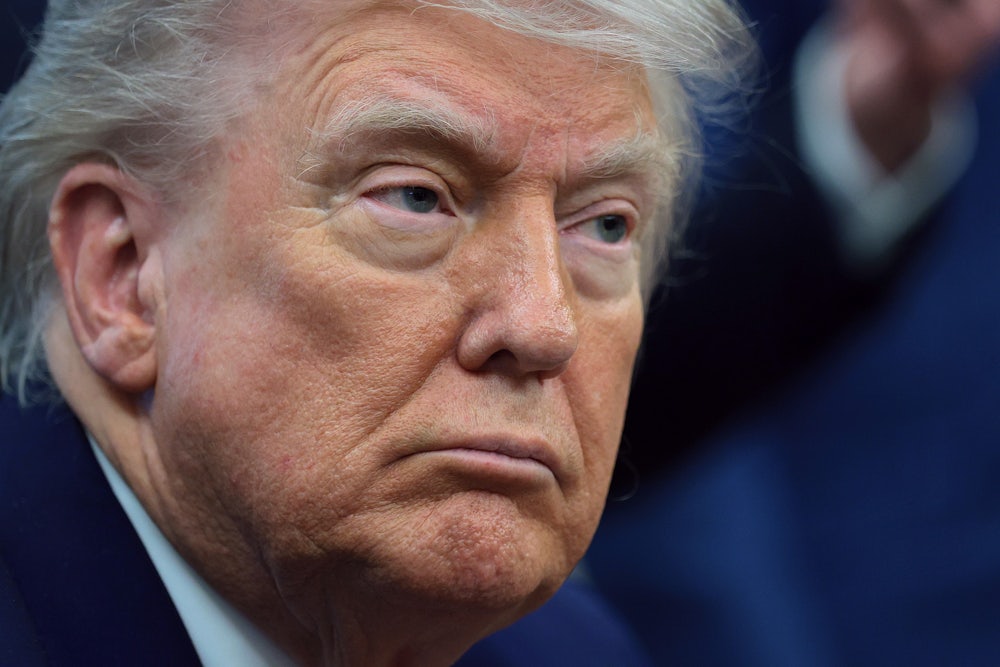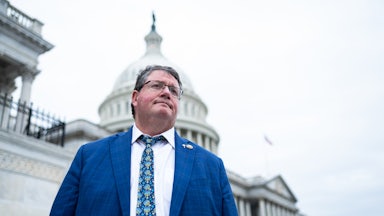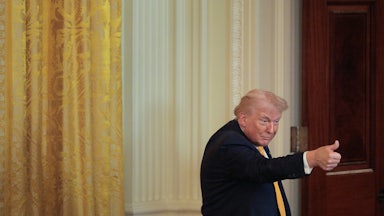President Donald Trump has mostly justified his lawless attempt to restrict international students from attending Harvard University by pretending it’s designed to root out the antisemites, woke radicals, and dangerous terrorists supposedly nesting in their ranks. Now, however, Trump has a new rationale: It’s all about helping young, aspiring Americans, particularly those in the working class.
“We have Americans who want to go there and to other places,” Trump told reporters over the weekend, adding angrily that many of Harvard’s international students are “bad” and are taking Americans’ slots: “They can’t go there because you have 31 percent foreign.”
Trump then tweeted:
I am considering taking Three Billion Dollars of Grant Money away from a very antisemitic Harvard, and giving it to TRADE SCHOOLS all across our land. What a great investment that would be for the USA, and so badly needed!!!
Yeah, OK. If Trump really wants to facilitate the upward mobility of America’s working-class youth, here’s a better way to do it: Persuade his fellow Republicans in the House to drop their new budget’s changes to financial aid for higher education, which will restrict access to it for large numbers of working-class students, probably including many who want to attend—yup—trade schools.
With Trump’s fury at Harvard getting worse, this turn in the saga suggests another grotesque subtext to all of it: Telling working-class families that the real obstacle their kids face is zero-sum competition from foreign students makes it easier to take away resources previously appropriated to boost working-class kids to fund tax cuts for the rich.
Trump’s assault is a wildly unhinged abuse of power in every way. Last week, Trump revoked Harvard’s ability to host international students, due to Harvard’s alleged failure to share sufficient “information” about foreign students in response to an administration demand. That demand was itself absurdly intrusive, and seemed designed not to be met, creating a pretext for Trump to broaden his attack. The revocation appears wholly lawless, and after Harvard sued, a court blocked it within hours.
At this point, there’s no need to pretend there’s a genuine public-interest rationale at work here. Everyone knows it’s all about getting universities to surrender to flatter Trump, or about executing a broader hostile MAGA takeover of liberal institutions. For instance, in an article reporting that Trump is now nixing Harvard’s federal contracts on top of canceling billions in grants, The New York Times notes almost in passing that Trump wants to bring Harvard “to its knees,” as if this is unremarkable, when it should be depicted as the power-crazed ravings of a Mad King.
But there’s something particularly ghoulish about Trump’s suggestion that his blockade on international students is about helping American kids who are unfairly displaced by them.
That’s because the “big, beautiful bill” that House Republicans passed last week—which Trump has urged Senate Republicans to adopt—could make attending college harder for countless such kids. For a detailed summary of its changes, see this piece by The New Republic’s Monica Potts: They would make it harder for full-time students to qualify for Pell Grants, bump off large numbers of part-time students, and restrict access to the program and other financial assistance for higher education in numerous other ways.
Indeed, a coalition of education advocacy organizations estimates that the bill’s changes to Pell Grants alone could deprive as many as 700,000 people of eligibility entirely and hit many more with higher costs. As Potts summarizes, all this “takes an ax to one of the few reliable ladders for working-class people seeking higher education” as an “engine for social mobility.” These are mostly poorer and working-class students by definition, many with jobs or young kids of their own.
“Across multiple education provisions in this bill, the data is clear: Millions of college students will wind up paying a lot more, and low-income students will be by far the hardest hit,” Jonathan Fansmith, a senior vice president at the American Council on Education, told me. “Hundreds of thousands of them will lose financial aid eligibility and their ability to afford college in the first place.”
All this will help fund another large tax cut for the rich: The Congressional Budget Office estimates that the changes will cut that sort of education spending by hundreds of billions of dollars.
Trump’s invocation of “TRADE SCHOOLS” is instructive here. While the GOP bill does expand Pell Grants to cover certain vocational programs—a longtime bipartisan goal—it takes away with one hand what it gives with the other. As analyses from American University and EdTrust explain, the bill’s eligibility restrictions will simultaneously make it harder for many vocational students to access those very same grants.
The general goal of investing more in vocational training is a laudable one. It’s been a mainstay of Democratic proposals—sometimes with GOP support—for years. Trump seemed to want more such funding when he threatened to take grant money from Harvard and give it to trade schools. Yet he offered no details on how this would work.
And guess what: If Trump and his party want to plow much more money into vocational training—without any strings attached like in the GOP bill—they can pass something that does this into law. But Trump’s interest in “trade schools” only perks up seriously when he can say he’s taking money away from a hated elite institution to fund them—that is, when it serves his zero-sum MAGA Two Minute Hate of the moment.
Which gets to the deeper scam here. We are often told Trump’s success is fueled by a backlash against the failures of meritocracy. Meritocratic elites, in this story, game our system to help their own, destroying broader bonds of social trust. Trump is the tribune of those who have been left behind by those self-dealing elites. This gives Trump’s attacks on elite institutions like Harvard enduring political appeal.
The failures of our meritocracy are serious, and here again, addressing them has long been a mainstay of the progressive agenda. And yes, the higher-ed system needs extensive reform. But let’s not hastily assume that anger over meritocracy’s failures will automatically boost support for Trump’s agenda. Polls suggest that a lot of voters in the middle don’t view things so simplistically. I suspect they recognize the university system, for all its flaws, less as a playground for elite meritocratic gaming and more as an engine of American innovation and greatness—and see Trump’s attacks on it as driven by dictatorial megalomania, not by any discernible critique of elite self-enrichment.
I also suspect that they know the idea that Trump wants to create a fairer, more solidaristic society that rewards true merit and hard work—rather than one that rewards self-dealing by corrupt elites like himself—is a knee-slapping howler of the highest order. True, not enough people know this as of now. But when Trump signs the bill shutting down a motor of meritocracy for far too many working-class kids—not to mention deeply cutting social insurance and taxes for the rich, transferring large amounts of resources upward to the wealthiest among us—it should go a long way toward setting that right.








